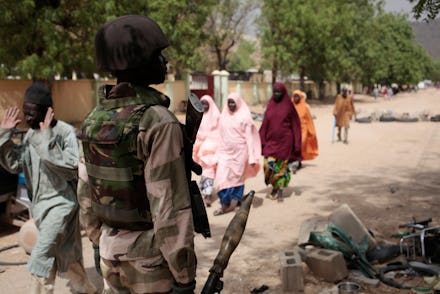At Least 160 Women and Children Have Been Rescued From Boko Haram

On Thursday, the Nigerian military announced they had rescued at least 160 women and children from Boko Haram's stronghold in the Sambisa Forest, where the "hostages were held in atrocious condition," according to Agence France-Presse.
The mission involved heavy fighting between the military and Boko Haram across nine of their camps, which reportedly destroyed part of the terrorist organization's hub and left several of its militants dead.
"They have been evacuated to a safety zone for further processing," Colonel Sani Usman said in a statement.
This is the second victory in the same week against the Nigerian-based rebel group, as almost 300 women and children were rescued from Boko Haram in a similar operation by the country's military on Tuesday.
Who are Boko Haram? While the organization has been in existence since 2002, it wasn't until 2009 that they started attacking with frequency.
Their name literally means Western-related activities are prohibited ("haram" means "sinful" in the Quran), which includes a "secular education," according to the BBC, and they have therefore targeted groups of girls who go to school, often turning them into sex slaves.
"The Nigerian government hasn't been able to quell the insurgency, and violence has spread to Cameroon, Chad, and Niger," writes the Council on Foreign Relations.
"Because of the military's human rights record, people do not trust them, plus they lack modern equipment, training and motivation," finds another BBC report.
The consequences of Nigeria's inability to quell Boko Haram has serious implications for the country's future, not to mention the rest of the region's.
#BringBackOurGirls. Neither group of rescued women and children from Tuesday or Thursday are from the 276 girls kidnapped one year ago in Chibok, an incident that sparked international outrage and the subsequent #BringBackOurGirls campaign.
"Well, that's just as much part of the story; there've been so many more that have been taken and people need to understand that," Paul Isenman, former country director of Nigeria for the World Bank, told Mic.
Aside from the personal suffering Boko Haram's targeting of women and children has caused, their relentless attacks have also posed an existential threat to Africa's biggest producer of oil and its largest economy.
"It's terrible. This kind of insecurity undercuts all types of development," Isenman told Mic. "It isn't just that companies are reluctant to invest in areas that are or could be attacked by Boko Haram — this lack of personal security undermines any kind of development for Nigerians, themselves. There's not just the fear of girls going to school, but it discourages investment and economic activity. We forget that physical security is at the heart of any kind of development."
While it's hard to sustain outrage at human rights violations, particularly given the rapidity of the news cycle, the international community has a duty to the kidnapped and violated women and children of Nigeria. Support and encouragement should be offered to the Nigerian military in order to permanently dismantle this barbaric organization. Not doing so could end up negatively impacting the entirety of West Africa and even its future generations.